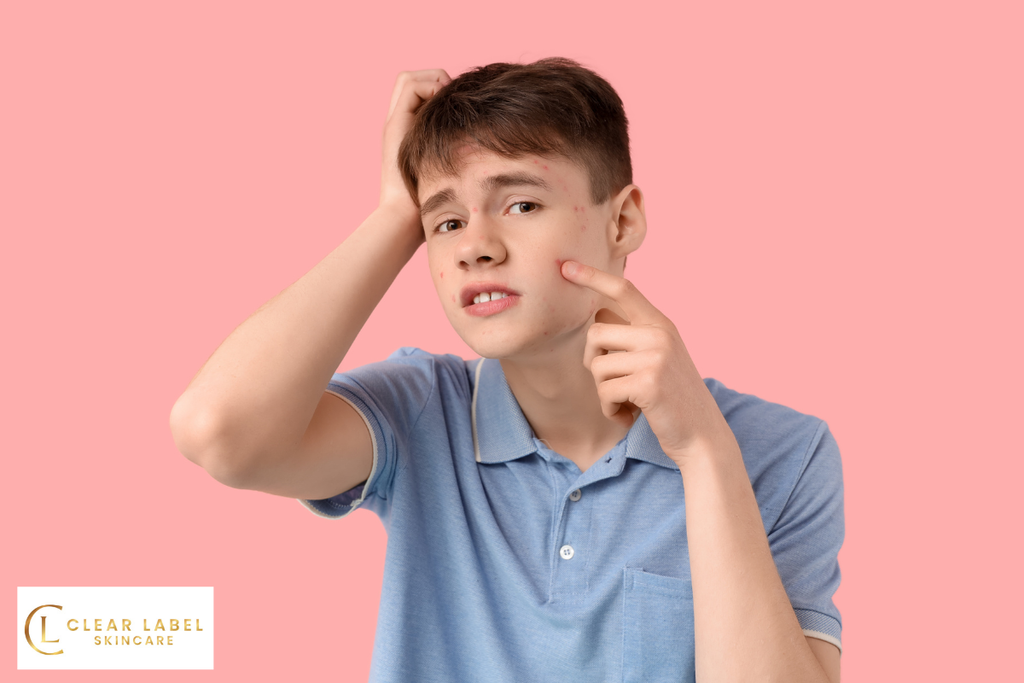Teen acne is a fairly common skin condition. 85% of adolescents around the world get it at some point. The face, back and chest are common areas where pimples, white and blackheads, and cysts occur. It can be distressing to teens as acne can be persistent. It’s not dangerous to physical health, but can affect a person’s self-esteem, prompting them to find relief using over-the-counter (OTC) and prescription remedies.
What Causes Teenage Acne?
With the onset of hormonal changes in puberty, sebum production can clog pores. Plus, oil glands are stimulated. Combine that with bacteria and perhaps a low-quality diet, and the “perfect storm” for acne is in place. Being aware of these triggers can help people find cures for teenage acne and receive personalized treatment plans to help fight breakouts.

Types of Acne in Teenagers
Since acne can present itself in different ways, there are multiple treatment approaches. We mentioned the various types above, and due to how the pores are closed or clogged, the treatments will vary. Medical professionals identify the type of acne and then provide the right teenage acne treatment to promote healing and minimize irritation.
Daily Skincare Routine for Managing Teenage Acne
A consistent, gentle skincare routine is the cornerstone of acne management. Key steps include:

Gentle Cleansing
Washing the face twice daily removes excess oil, dirt, and impurities without stripping natural moisture. The best cleanser for teenage acne is non-comedogenic and formulated for acne-prone skin. A glycolic cleanser for acne or glycolic acid acne wash exfoliates dead skin cells, unclogging pores effectively. Alternatively, a vitamin C cleanser for acne brightens the skin while combating bacteria. Avoid harsh scrubbing, as it can worsen inflammation and irritate sensitive skin.

Moisturizing (Even for Oily Skin)
It can seem counterintuitive; why would you want to moisturize if your skin is oily? Actually, moisturizing strengthens the skin barrier. Acne treatments can be irritating in themselves. Moisturizers can hydrate the skin and support overall skin health. When looking for a moisturizer, go with ones that have hyaluronic acid or niacinamide to prevent dryness, which can trigger excess oil production.

Sun Protection
Oil-free sunscreen, applied daily, with SPF 30 or higher is vital to help deal with acne as UV rays can make inflammation and acne scars worse. There are sunscreen products designed for acne-prone skin. These products work without clogging pores, so they’re a good addition to teenage acne treatment.
Effective Teenage Acne Treatment Options
With so many acne treatment products out there, it can be confusing when trying to figure out which would work best. Over-the-counter products with benzoyl peroxide reduce bacteria and inflammation. These products often include salicylic acid to unclog pores. Retinoids like adapalene can prevent clogged pores by promoting cell turnover.
For moderate to severe acne, a teen may need to see a dermatologist for a prescription topical or oral antibiotics, stronger retinoids, or isotretinoin. Some teens opt for chemical peels or laser therapy. The best acne treatment for teenage girls may include hormonal therapies to regulate androgens, while best acne products for teenage guys can include strong exfoliants for oily skin.
Best Teenage Acne Products to Try
Choosing the right teenage acne product can significantly improve outcomes. Recommended products include a gentle glycolic acid acne wash with ceramides to restore the skin barrier. As previously mentioned, some products that combine benzoyl peroxide and salicylic acid for dual-action treatment can be effective. Some people swear by azelaic acid for acne, which kills bacteria. Always patch-test new products and introduce them gradually to avoid irritation.
Lifestyle Habits That Can Help Prevent Breakouts
Changes to habits and food intake can help manage acne. Drinking plenty of water flushes toxins from the body and maintains skin balance. Eating fewer sugary snacks and focusing on more fruits and vegetables supports skin health.
Managing stress is important; yoga and mindfulness practices can help lower cortisol levels, an acne trigger. Exercise is also a great stress reliever. Combine these habits with 7–9 hours of sleep a night, and they’re effective cures for teenage acne that help promote clear skin.
A few hygiene changes can help, too. Washing pillowcases weekly and avoiding touching the face can help keep bacteria from spreading.
When to See a Dermatologist
Managing teenage acne can be tough; teens may try a variety of OTC products that may seem to help for a while. Acne can be stubborn, and it may require targeted treatments. Also, many people don’t know that OTC treatments can take time to work. It may be that a few more weeks using them could help.
In the meantime, while teens deal with the physical aspects of acne, they are also dealing with being self-conscious about how they look. While OTC therapies are effective for mild acne, moderate to severe breakouts might not respond to these products. That’s because more severe acne frequently comes from hormonal fluctuations, follicular occlusion, or microbial overgrowth.
Consult a dermatologist if acne is cystic, nodular, or causing scarring, or if store-bought treatments fail after 6–8 weeks. Acne that significantly affects mental health or self-esteem also warrants a visit. Professional skincare can make the difference in the scope and duration of acne outbreaks.

Explore Acne Treatments with Clear Label Skincare
Clear Label Skincare offers a range of treatments to help teens with acne. Book your treatment now and look forward to clearer skin! If you have any questions, please call (818) 442-7037.
Frequently Asked Questions
Q: What age does teenage acne usually start?
A: Acne typically begins between ages 11 and 14 with puberty onset. It can occur on the face, back and chest.
Q: When does teenage acne go away?
A: Acne often subsides by late teens or early 20s. Persistent acne can impact self-esteem, and keeping it under control may take dedicated effort and acne-specific treatments.
Q: How long does teenage acne last?
A: Acne may persist 5–10 years, depending on treatment efficacy. Different people’s acne issues can often be influenced by multiple lifestyle factors.

